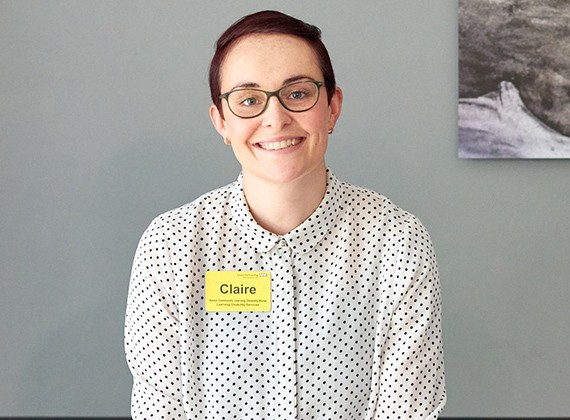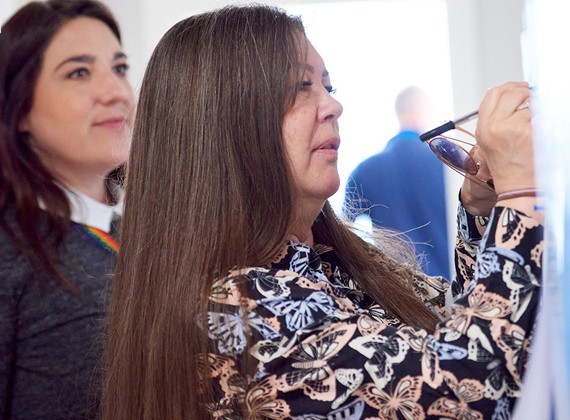

Peer support
Become a peer support worker
One of the ways people with lived experience can get involved at Sussex Partnership is to become a peer support worker.
A peer support worker is someone with lived experience of mental health issues, or other relevant issues, who is employed to offer support to people who use our services.
The main focus of a peer support worker is to build relationships using common experience, shared learning, developing skills, strengths and new perspectives.
Peer support focuses on:
- Choice
- Hope
- Empowerment
- Spirituality/meaning and purpose
- Environment
We have currently have around 70 peer support workers and peer support specialists who are supported by our Peer Support team. The team is made up of experienced peers who work with clinical teams to support and develop peer support roles and also help with developments, coaching, networking and training.
All our peer support roles are advertised on our careers section. Thinking of applying? Download our peer support recruitment guide.
Peer support...
- Is guided by principles such as hope, mutuality, reciprocity and strengths
- Can take many forms, it is not exclusive to mental health or any type of service
- Enables peers to work in a non-directive, empowering way to focus on what is important to people and to be alongside them in their recovery
- Helps people understand their mental health experience and negotiate the services they need to access
- Is experiential and relationship based
- Work is carried out one to one, and also in groups.
- Peer support workers work in a clinical team, supporting service users with their recovery both individually and in groups
- Peer support can involve working on wards, in community teams, or in rehab services. Sometimes we have more specialist roles like forensic mental health or veteran services
- There are other organisations like MIND, CAPITAL, Southdown, Sussex Oakleaf and Richmond Fellowship that employ peers too, so you don’t have to work in the NHS
- If you do apply for a peer support role it will be good if you have experience of volunteering or working with people
- You may have experience already of peer support either formally in a role, or informally with other service users or people you know
- Have a look at IMROC and Scottish Recovery Network to find out more about peer support principles and practice
- Gaining experience as an Expert By Experience, contact spft.
participation to receive regular updates of opportunities@nhs.net - We can add you to our peer support mailing list and send you job adverts for peer support roles when they come up, or you can search 'peer support' on NHS jobs website
- We offer specific peer support training packages to our peer support workers. We're continually expanding with new roles being developed. If you've completed, or can complete, the Expert by Experience training, this is a good foundation for applying for a role later on.
We provide certified peer support training to our peer support workers.
Our mandatory training covers all core aspects of working in clinical teams, such as safeguarding, information governance and fire safety, and is delivered through our internal training system, 'My Learning'.
One to one sessions with senior peer support coordinators are also available and can help to identify additional training needs for your career development.
" It was certainly a challenging adjustment at first, going from a role where not many people other than my closest colleagues knew about my struggles, to a role where I felt I had been hired because of my struggles. But that challenge became a strength, one of immediate shared understanding from the minute I introduced myself to every service user.
"There was a sense of trust, a feeling of “they get it” in every professional relationship. Not only that, I felt like I wasn’t limited to the work I was able to do with service users. Whether it was going on a walk for the first time in weeks, or looking up new internet providers, so much of my job was asking them if there was anything I could help with that would make the here and now easier.
"I know how invasive it feels to have strangers asking you the same questions over and over again, thinking that they aren’t listening or communicating with each other. It could also make you feel like your entire identity revolves around your mental health. Therefore, peer support often (to the service user) feels less threatening, a space for them to figure out their purpose and the person they are becoming. The addition of this relationship in someone’s care helps teams realise that despite professional differences or different qualifications, everyone is working towards the same goal: providing the highest standard of care that you can for every single service user."
If you're a service user, you may be offered the opportunity to work with a peer support worker. This is someone who has been on their own recovery journey, or has been a carer for someone on a recovery journey. They will be able to understand and empathise with what you are going through, as they will have faced their own difficulties themselves.
Peer support workers can help you to feel accepted and understood, and more hopeful and positive about the future. Peer support workers are not clinical roles. They will not be providing treatment or diagnosis but they are able to share strategies and skills that they have developed through their own recovery journey which might also help you.
Some examples of support that you may receive from a peer support worker include:
- One to one and group sessions to help you progress towards your own recovery goals
- Attend appointments and meetings with you, and discuss any concerns or worries you may have beforehand
- Accompany you to places, groups etc to help build your own confidence
- Conversations, sharing life experiences, listening and understanding
- Advocating for and linking to clinical team and other services you may find useful.
Benefits of working with a peer support worker include:
- Increased self-esteem and confidence
- Improved problem-solving skills
- An increased sense of empowerment
- Improved access to work and education
- More friends, better relationships and more confidence
- Greater feelings of being accepted and understood
- Reduced self-stigmatisation and increased understanding of self perspective
- Hope about your potential and the future.



